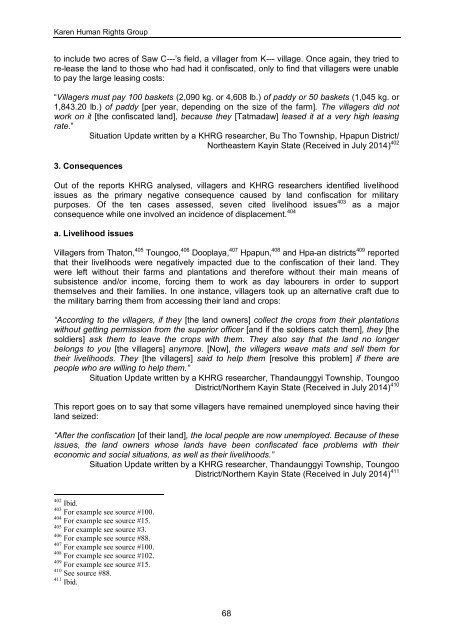With only our voices (English)
Create successful ePaper yourself
Turn your PDF publications into a flip-book with our unique Google optimized e-Paper software.
Karen Human Rights Group<br />
to include two acres of Saw C---’s field, a villager from K--- village. Once again, they tried to<br />
re-lease the land to those who had had it confiscated, <strong>only</strong> to find that villagers were unable<br />
to pay the large leasing costs:<br />
“Villagers must pay 100 baskets (2,090 kg. or 4,608 lb.) of paddy or 50 baskets (1,045 kg. or<br />
1,843.20 lb.) of paddy [per year, depending on the size of the farm]. The villagers did not<br />
work on it [the confiscated land], because they [Tatmadaw] leased it at a very high leasing<br />
rate.”<br />
Situation Update written by a KHRG researcher, Bu Tho Township, Hpapun District/<br />
Northeastern Kayin State (Received in July 2014) 402<br />
3. Consequences<br />
Out of the reports KHRG analysed, villagers and KHRG researchers identified livelihood<br />
issues as the primary negative consequence caused by land confiscation for military<br />
purposes. Of the ten cases assessed, seven cited livelihood issues 403 as a major<br />
consequence while one involved an incidence of displacement. 404<br />
a. Livelihood issues<br />
Villagers from Thaton, 405 Toungoo, 406 Dooplaya, 407 Hpapun, 408 and Hpa-an districts 409 reported<br />
that their livelihoods were negatively impacted due to the confiscation of their land. They<br />
were left without their farms and plantations and therefore without their main means of<br />
subsistence and/or income, forcing them to work as day lab<strong>our</strong>ers in order to support<br />
themselves and their families. In one instance, villagers took up an alternative craft due to<br />
the military barring them from accessing their land and crops:<br />
“According to the villagers, if they [the land owners] collect the crops from their plantations<br />
without getting permission from the superior officer [and if the soldiers catch them], they [the<br />
soldiers] ask them to leave the crops with them. They also say that the land no longer<br />
belongs to you [the villagers] anymore. [Now], the villagers weave mats and sell them for<br />
their livelihoods. They [the villagers] said to help them [resolve this problem] if there are<br />
people who are willing to help them.”<br />
Situation Update written by a KHRG researcher, Thandaunggyi Township, Toungoo<br />
District/Northern Kayin State (Received in July 2014) 410<br />
This report goes on to say that some villagers have remained unemployed since having their<br />
land seized:<br />
“After the confiscation [of their land], the local people are now unemployed. Because of these<br />
issues, the land owners whose lands have been confiscated face problems with their<br />
economic and social situations, as well as their livelihoods.”<br />
Situation Update written by a KHRG researcher, Thandaunggyi Township, Toungoo<br />
District/Northern Kayin State (Received in July 2014) 411<br />
402 Ibid.<br />
403 For example see s<strong>our</strong>ce #100.<br />
404 For example see s<strong>our</strong>ce #15.<br />
405 For example see s<strong>our</strong>ce #3.<br />
406 For example see s<strong>our</strong>ce #88.<br />
407 For example see s<strong>our</strong>ce #100.<br />
408 For example see s<strong>our</strong>ce #102.<br />
409 For example see s<strong>our</strong>ce #15.<br />
410 See s<strong>our</strong>ce #88.<br />
411 Ibid.<br />
68


















